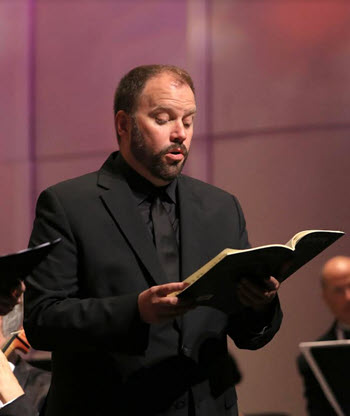by Thomas Cooley
Published May 27, 2024
“You have mild to moderate hearing loss, and we recommend that you begin using hearing aids.”
These words from my audiologist instantly brought me to tears: I felt it was a pronouncement about the end of my singing and teaching career. I had gone for a hearing test following a fairly severe middle-ear infection. My ears were stopped up so completely that I’d come to realize how much hearing I’d already lost in my right ear. I also had tinnitus, ringing in both ears.

This was in the winter of 2020. The pandemic world of masked faces also made me notice how much I had become reliant on lip-reading. The doctor asked why I was crying. I responded, “I just don’t know other active singers who use hearing aids.”
We’re all keenly aware of the stigma in classical music about people with hearing loss. The doctor understood what an especially big deal this was for me, so we decided to give it another year to see how things progressed.
A year later, I returned. My hearing had worsened slightly. My audiologist maintains that tinnitus is a result of your brain scanning for full-frequency sound and filling in the gaps where it can no longer detect sound vibrations. She says that one’s brain will slowly shut down the hearing center if it can no longer detect sound due to hearing loss. So there is a therapeutic as well as an assistive benefit to wearing hearing aids.
I also learned that this is an inherited condition. My biological mother and aunts all wear hearing aids. So, in June 2022, I finally got my first pair of hearing aids.
Upon returning home, I walked into my garden. Between the wind in the trees, the overtones of our wind chimes, and the myriad birds that I could suddenly hear, I felt a sense of hope returning. The next night we attended an open-air concert by the incredible jazz singer Gregory Porter. The full spectrum of sound in his voice was overwhelming. Tears streamed down my face in gratitude — but also in realizing how much I had been missing. I compare it to getting eyeglasses for the first time, where things are brought into intense, sharp focus: It’s a shock when you instantly realize how much detail you couldn’t see!
As I began to explore my singing, I quickly understood that I had been pushing and struggling to hear my own overtones, or the “ring” in my voice. Between this tiny electronic assistance and intense work with my teacher, I now feel my voice has been developing and growing, using less pressure and effort. I am able to hear what my own voice is actually doing.
There is a learning curve, for sure. Sometimes, the hearing aid’s AI dampens the input above certain decibel levels. Some harmonies seem a bit wonky, due to my tinnitus. And dealing with hardware and learning to trust my new ears has taken a while.
My audiologist has me using Widex Moment hearing aids. These are top-of-the-line technology, using AI to assist in creating sound profiles for various situations. At a touch of my iPhone, I can customize settings for singing, for loud restaurants, for travel situations, and so on. (They assist me not just with the performing aspect of my job, but also the social side of things, which is just as important!)
The devices are so small and discreet that, when I mention it, people say they had no idea. They don’t produce feedback on any of my settings, and the fidelity and lag time is so infinitesimal that I simply don’t notice any issues when I’m together with my fellow instrumentalists and singers.
Thus far, I haven’t felt any active stigmatization. Indeed, when I have had trouble hearing — due to where I was sitting or standing — people have often been accommodating and supportive. I continue to receive validation from my teacher, my husband, and from so many conductors and colleagues. I am grateful to live in this modern world in which ever-advancing technology enables the hearing-impaired to have remarkable assistance. For me, at this stage of my career, I know that I have many years ahead of me as both a singer and a teacher. It’s been a remarkable ride.
Tenor Thomas Cooley, an expert in music by Bach and Handel, also performs Romantic and modern concert works with leading ensembles and conductors. His singing of the Evangelist, on a recent recording of the St. John Passion with conductor Nicholas McGegan, received a rave review from Early Music America. He is on the voice faculty at Choate Rosemary Hall in Connecticut and maintains a private voice studio.

